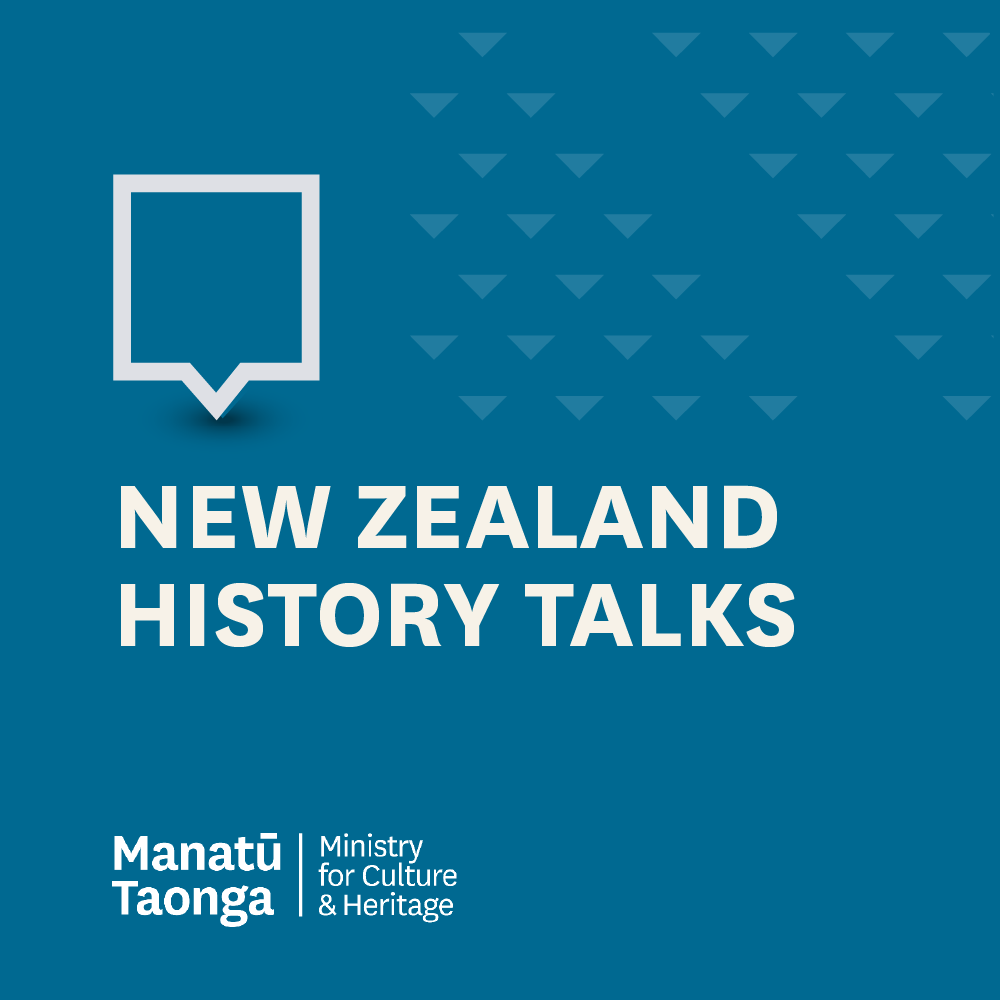Episodes
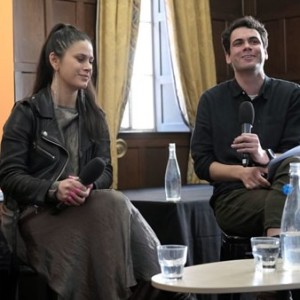
Friday Sep 23, 2022
Mahuru Māori: Māni Dunlop and Jamie Tahana
Friday Sep 23, 2022
Friday Sep 23, 2022
Māni Dunlop (Ngāpuhi) and Jamie Tahana (Ngāti Pikiao, Ngāti Makino, Te Arawa) are journalists and national broadcasters who actively champion te reo Māori me nga tikanga Māori through their work.
Māni was the first Māori journalist at RNZ to host a weekday show, while Jamie is one of RNZ’s youngest Māori News Directors. They began their careers as RNZ interns, Māni in 2011 and Jamie in 2014. Māni initially worked in the general newsroom focusing on housing and social issues. Jamie started at Radio New Zealand Pacific (formerly International) with a focus on climate change and political undulations.
Now, they’re incredibly popular Māori broadcasters. Every week, more than 600,000 people listen to RNZ and in 2021 the listenership of Te Ao Māori shows increased 55%. Thousands of Twitter followers want to know what their ‘takes’ are, beyond the stories they write and produce to the public.
For Mahuru Māori, Māni and Jamie spoke about their experiences, challenges, and triumphs of being at the front line of change in public radio. The past decade has seen dramatic changes in public radio, influenced by iwi radio, social media, politics, and pandemics. Today, these two young Māori journalists are now major decision-makers in the inclusion of Māori content and te reo Māori at a national level.
Facilitated by Pou Matua Mātauranga Māori, Senior Historian Mātauranga Māori, Matariki Williams (Tūhoe, Ngāti Hauiti, Taranaki, Ngāti Whakaue).
These monthly Public History Talks are a collaboration between the Alexander Turnbull Library and Manatū Taonga Ministry for Culture and Heritage. Recorded live at the Wellesley Boutique Hotel on 6 September 2022.
Download a transcript of this talk:
https://nzhistory.govt.nz/files/pdfs/transcript-mahuru-maori-2022-09-07.pdf

Tuesday Aug 02, 2022
Tuesday Aug 02, 2022
Liana MacDonald (Ngāti Kuia, Rangitāne o Wairau, Ngāti Koata) is a lecturer in the Faculty of Education, Victoria University of Wellington. She is interested in how racism, whiteness, and settler colonialism manifest in national institutions.
In this talk, Liana focusses on two significant conflicts between mana whenua and British and settler militia during the early stages of the New Zealand Wars and how they are remembered today. Interviews reveal how the Wairau Affray (1843) is remembered differently by settler and Indigenous people from the Marlborough region. Researcher observations are the basis for thinking about how sites associated with the Battle of Boulcott's Farm (1846) reflect settler perspectives about the past. The research in this talk is part of a large-scale ethnographic study called He Taonga te Wareware? Remembering and Forgetting New Zealand’s Colonial Past.
These monthly Public History Talks are a collaboration between the Alexander Turnbull Library and Manatū Taonga Ministry for Culture and Heritage. Recorded live via Zoom, 1 June 2022.
Download a transcript of this talk:
https://nzhistory.govt.nz/files/pdfs/transcript-liana-macdonald-pht-2022-07-26.pdf
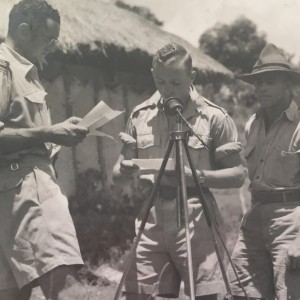
Tuesday Aug 02, 2022
Tuesday Aug 02, 2022
In the 1940s radio played a central role in the life of the New Zealand household as a source of news and entertainment. Sound historian Sarah Johnston is researching radio during this era, particularly the role of our first radio war correspondents, who travelled with the New Zealand forces in North Africa, the Middle East, Italy and in the Pacific as mobile broadcasting units.
Sarah outlines details she has uncovered in her research, including the way demand from listeners back home shaped the work of the broadcasting units. Her talk includes archived radio recordings from the era, courtesy of RNZ and Ngā Taonga Sound & Vision.
This talk is also available on YouTube.
These monthly Public History Talks are a collaboration between the Alexander Turnbull Library and Manatū Taonga Ministry for Culture and Heritage. Recorded live via Zoom, 5 May 2022.
Download a transcript of this talk:
https://nzhistory.govt.nz//files/pdfs/transcript-sarah-johnston-pht-2022-06-14.pdf

Friday Jul 08, 2022
Friday Jul 08, 2022
In September 2019, Hon Chris Hipkins announced Aotearoa New Zealand's histories would be taught in all schools and kura from 2022 (later extended to 2023).
In this talk Dr Genaro Oliveira shared findings from a comprehensive survey of primary school teachers across the Manawatū region about history teaching at Years 1 to 6.
Answers from the ten local schools corroborate the anecdotal evidence many teachers and people involved with primary education have known for a while: first, despite differences of approach, focus and depth, primary schools have already been teaching Aotearoa New Zealand’s histories long before the announcement and through creative and critical approaches; and second, despite prior experience teaching history, most teachers still lack confidence teaching New Zealand histories and welcome Professional Learning Development (PLDs).
These monthly Public History Talks are a collaboration between the Alexander Turnbull Library and Manatū Taonga Ministry for Culture and Heritage. Recorded live via Zoom, 6 March 2022.
Download a transcript of this talk:
https://nzhistory.govt.nz/files/pdfs/transcript-genaro-oliveira-pht 2022-07-01.pdf
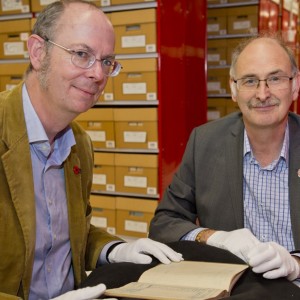
Wednesday Jun 08, 2022
‘There was no honour in it’: Two aspects of New Zealand’s military history
Wednesday Jun 08, 2022
Wednesday Jun 08, 2022
Please note: This talk contains material that may be distressing to some listeners, including the discussions of war crimes. If you wish to skip this discussion, it runs from 9:19 through to 16:36. Please take care of yourself, and if you don't think this talk is for you, no worries, and we hope you'll listen again soon.
In this talk, military historians John Crawford and Matthew Buck talk about results from their recent research projects.
Over the last 35 years, John Crawford has written on many aspects of the history of the New Zealand Armed Forces and defence policy. His recent research into New Zealand’s campaigns against the Ottoman Empire during the First World War has uncovered several interesting aspects of New Zealand’s involvement in the Senussi Campaign, fought in Libya in 1915. John’s talk will focus on the Christmas Day attack on the Senussi forces, an under-researched episode in New Zealand’s military history thus far.
Matthew Buck is Senior Advisor Heritage at the New Zealand Defence Force. His focus in recent months has been on veterans’ issues and the way in which the services of veterans were recognised following the two world wars. His work on how medals were distributed after the Second World War is just one aspect of this work. How this came to be a public policy issue lies at the heart of his presentation.
These monthly Public History Talks are a collaboration between the Alexander Turnbull Library and Manatū Taonga Ministry for Culture and Heritage. Recorded live at the National Library of New Zealand, 3 November 2021.
Download a transcript of this talk:
https://nzhistory.govt.nz/files/pdfs/transcipt-john-crawford-and-matthew-buck-2021-11-03.pdf

Friday Mar 04, 2022
The Platform: the radical legacy of the Polynesian Panthers
Friday Mar 04, 2022
Friday Mar 04, 2022
In this talk, Melani Anae, Associate Professor in Pacific Studies at the University of Auckland discusses aspects of her recent book, The Platform: the radical legacy of the Polynesian Panthers. In the book she writes, ‘Fifty years ago the Polynesian Panther Party began to shine a light on racism and oppressive systems, and we made small changes. But these small changes were and are so much greater than the sum of their parts; they are writ large by the liberating education some of us are still involved in and the snowballing effect it has.’
The book is both deeply personal and highly political and recalls the radical activism of Auckland’s Polynesian Panthers. In solidarity with the US Black Panther Party, the Polynesian Panthers were founded in response to the racist treatment of Pacific Islanders in the era of the Dawn Raids. Central to the group’s philosophy was a three-point ‘platform’ of peaceful resistance, Pacific empowerment and educating New Zealand about persistent and systemic racism.
These monthly Public History Talks are a collaboration between the National Library of New Zealand and Manatū Taonga Ministry for Culture and Heritage. Recorded live at the National Library of New Zealand, 6 August 2021.
Download a transcript of this talk:
https://nzhistory.govt.nz/files/pdfs/melani-anae-transcript.pdf
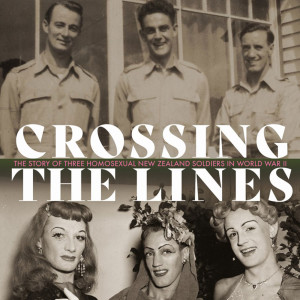
Tuesday Oct 05, 2021
Crossing the lines: the story of three homosexual New Zealand soldiers in WW2
Tuesday Oct 05, 2021
Tuesday Oct 05, 2021
In this talk author Brent Coutts discusses his recently published book, Crossing the Lines, a history of New Zealand homosexual soldiers in the Second World War.
While he uncovered fifty homosexual men who served in the military during the war, his research focused on Ralph Dyer, Douglas Morison, and Harold Robinson, three men who were female impersonators in the Pacific Kiwi Concert Party and Tui Concert Party. Coutts discusses their lives before, during, and after the war, and how he uncovered this new historical narrative which enriches our understanding of the New Zealand soldier experience during this conflict.
These monthly Public History Talks are a collaboration between the National Library of New Zealand and the Ministry for Culture and Heritage. Recorded live at the National Library of New Zealand, 7 July 2021.
Download a transcript of this talk:
https://nzhistory.govt.nz/files/pdfs/brent-coutts-transcript.pdf

Wednesday Jul 28, 2021
Reflecting on the value of social media as a history-research tool
Wednesday Jul 28, 2021
Wednesday Jul 28, 2021
In this talk, historian Ryan Bodman explores the value of social media as a 21st century history-research tool. Over the past five years, Ryan has been researching and writing Rugby League: A New Zealand History, which is a social and cultural history of the football code in New Zealand.
As part of this project, he has developed a social media account under the same name, which promotes public engagement with his research outputs and has brought a collaborative component to his research process.
In this talk, Ryan will explore the use of social media in the development of his book, paying particular attention to the value of social media to academic historians seeking to engage with people from outside of the university-setting.
The monthly Public History Talks are a collaboration between the National Library of New Zealand and the Ministry for Culture and Heritage.
Recorded live at the National Library of New Zealand, 2 June 2021.
Download a transcript of this talk:
https://nzhistory.govt.nz/files/pdfs/ryan-bodman-transcript-june-2021.pdf
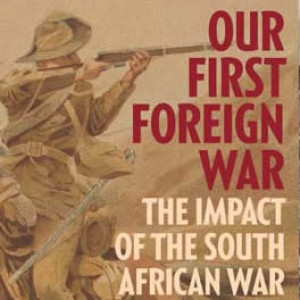
Wednesday Jun 02, 2021
Dissenting Voices – New Zealand and the South African War 1899–1902
Wednesday Jun 02, 2021
Wednesday Jun 02, 2021
In this talk, Nigel Robson, author of Our first foreign war (Massey University Press, 2021), examines opposition within New Zealand to the South African War 1899–1902.
At a time when patriotic fervour engulfed the country, those who questioned British actions in South Africa, or criticised the widespread support for the conflict that characterized New Zealand’s response, risked public vilification and being labelled a ‘pro-Boer’.
From J. Grattan Grey, the Hansard chief reporter who described the ‘wave of imperialism’ sweeping Australasia in the New York Times, to Charlotte Bewicke, who raised funds for sick and injured Boers, dissenters who publicly voiced opposition to the war displayed both determination and fortitude.
The monthly Public History Talks are a collaboration between the National Library of New Zealand and the Ministry for Culture and Heritage.
Recorded live at the National Library of New Zealand, 5 May 2021.
Download a transcript of this talk:
https://nzhistory.govt.nz/files/pdfs/Nigel-Robson-transcript_history-talk_5-May-2021.pdf
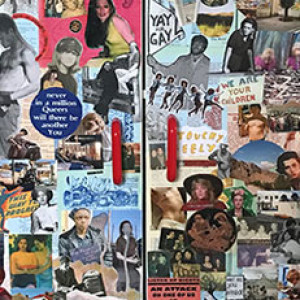
Wednesday Jun 02, 2021
Inside the Bubble
Wednesday Jun 02, 2021
Wednesday Jun 02, 2021
Inside the Bubble : Kei Roto i te Miru is a collection of human stories recorded during Covid-19 lockdown in Aotearoa New Zealand. Oral historians worked in partnership with Ngā Pātaka Kōrero Auckland Libraries and Manatu Taonga to collect, create and conserve viewpoints from around the country.
Oral historian Will Hansen interviewed his flatmate Jack Hitchcox on ‘Queerintine’; living in an all queer flat during lockdown, being a frontline health worker, making art, watching films, reading books, transitioning, coming out to family and friends and future plans.
For further information or support check out InsideOut or Rainbow Youth
Transcript of this talk:
https://nzhistory.govt.nz/files/documents/jacks-story-transcript.pdf
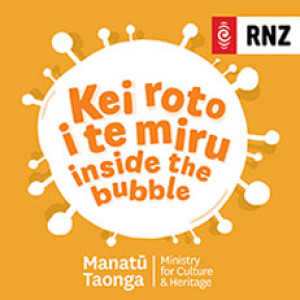
Thursday Apr 08, 2021
Kei roto i te miru: inside the bubble
Thursday Apr 08, 2021
Thursday Apr 08, 2021
What happens when a pandemic hits and the country is locked down? How can we help keep New Zealanders connected?
In collaboration with Sue Berman, Principal Oral History Advisor Auckland Libraries, staff at Manatū Taonga Ministry for Culture and Heritage got on Zoom and hatched a plan to use free online software to encourage nine oral historians from various communities around the country to collect short oral histories with our support. Thirty-five stories with Ngāti Porou, LGBTQI community members, rural Pākehā, health workers, musicians, young Mums, Pacific Island New Zealanders, Northland community workers and Chinese New Zealanders were the result.
In this talk Tuaratini will discuss her involvement in the project as a community interviewer, while radio producer and journalist Teresa Cowie will describe her experience working on the creative output of the oral histories. The resulting weekly podcast series, ‘Kei roto i te miru: inside the bubble’, launched on 25 March this year based on the interviews undertaken during the 2020 Covid-19 lockdown.
These monthly Public History Talks are a collaboration between the National Library of New Zealand and the Ministry for Culture and Heritage.
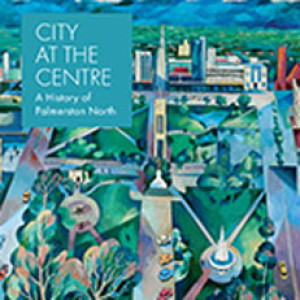
Thursday Mar 04, 2021
‘Palmy Proud’? Audience and Approach in Writing the History of a Provincial City
Thursday Mar 04, 2021
Thursday Mar 04, 2021
In this Public History Talk, co-editor and a writer for City at the Centre: A History of Palmerston North Margaret Tennant will discuss the dilemmas faced by its editors and the question of audience for such a volume: whether to take a thematic, ‘slice’ or chronological approach, how much to assume in terms of local knowledge, and whether to link with a commemorative event.
City at the Centre evolved with the knowledge of other, complementary forms of story-telling about place, but also against perceptions of Palmerston North as ‘boring’ and less significant than the four main centres. How much history is obliged to become promotion becomes an issue. And, as with any publication, there are always the things which would have been done differently with hindsight.
Pulled together during the 2020 Covid lockdown, City at the Centre was published in October 2020.
In a previous life Margaret Tennant lectured in history at Massey University, her special interests the history of women, of health and of social policy. She has more recently focused on local history, and is on the PHANZA national committee.
These monthly Public History Talks are a collaboration between the National Library of New Zealand and the Ministry for Culture and Heritage.
Recorded live at the National Library of New Zealand, 3 March 2020.
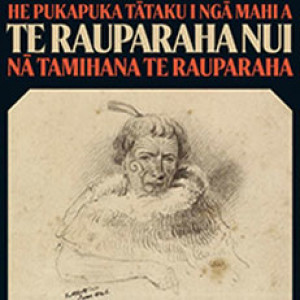
Thursday Mar 04, 2021
Tamihana Te Rauparaha’s life of Te Rauparaha
Thursday Mar 04, 2021
Thursday Mar 04, 2021
‘He Pukapuka Tātaku i ngā Mahi a Te Rauparaha Nui’ is a 50,000-word account of Te Rauparaha’s life written by his son Tamihana Te Rauparaha in the late 1860s. A rich source of Ngāti Toa history, language and culture, it offers fascinating insights into traditional Māori society and the tumultuous history of the 1820s and 1830s. This was an era characterised by intertribal conflict and the redrawing of the tribal map of Aotearoa, as well as by early encounters between Māori and Europeans that were largely conducted on Māori terms. Tamihana’s account of his father’s life has now been published in full for the first time in a parallel Māori/English edition.
In this talk, the book’s translator and editor Ross Calman will discuss the historical context that led to the creation of Tamihana’s manuscript, give an overview of how the manuscript has been represented by various writers and translators over the past 150 years and describe some of the challenges he faced in interpreting the manuscript for a modern audience.
These monthly Public History Talks are a collaboration between the National Library of New Zealand and the Ministry for Culture and Heritage.
Recorded live at the National Library of New Zealand, 2 December 2020.
See also Te Rauparaha: Kei Wareware podcast series
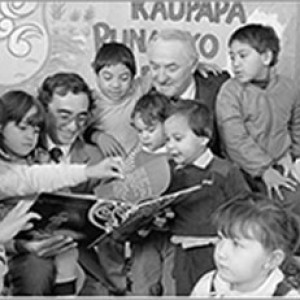
Monday Nov 16, 2020
Te Mana O Te Reo Māori
Monday Nov 16, 2020
Monday Nov 16, 2020
Today, te reo Māori is recognised as an important part of New Zealand culture and identity. But things were not always so hopeful for the language. By the 1970s, te reo Māori was on the verge of extinction. The long journey of revitalisation has been marked with many challenges and many victories.
Part of the journey was taking Wai 11, the te reo Māori claim, to the Waitangi Tribunal. The resulting report confirmed te reo Māori was a taonga the Crown had to actively protect and contributed to te reo Māori being made an official language in 1987.
Te reo Māori champions Piripi Walker and Justice Joe Williams speak about their own journeys in language revitalisation and the wider movement across the country. A facilitated discussion with Dr Vincent Olsen-Reeder follows.
This talk is in support of the new Te Mana O Te Reo Māori online story, part of Te Tai Treaty Settlement Stories, a programme initiated by Manatū Taonga which aims to enhance understanding of the past by exploring Treaty settlements and their enduring impact.
These monthly Public History Talks are a collaboration between the National Library of New Zealand and the Ministry for Culture and Heritage.
Recorded live at the National Library of New Zealand, 4 November 2020.
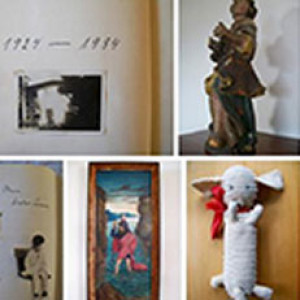
Wednesday Oct 07, 2020
Unpacking the Suitcase
Wednesday Oct 07, 2020
Wednesday Oct 07, 2020
When German-Jewish refugees arrived in New Zealand in the 1930s fleeing Hitler’s Europe, they brought everything they could from their former homes: furniture, luggage, personal documents, musical instruments, artwork, books, silverware, linen, a typewriter. Some of these humble and remarkable domestic objects survive today, a few in public heritage collections; most in the private family homes of descendants.
But while the Jewish refugee migration story is well known, less so is the story of those objects. In this talk, Louisa Hormann shares findings from a research project exploring the relationships between Holocaust survivor refugee families, their descendants, and the material objects they have inherited.
These monthly Public History Talks are a collaboration between the National Library of New Zealand and the Ministry for Culture and Heritage.
Recorded live at the National Library of New Zealand, 7 October 2020.
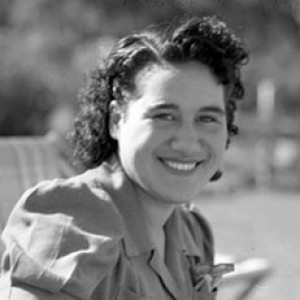
Wednesday Sep 02, 2020
Māori women and the armed forces in WWII
Wednesday Sep 02, 2020
Wednesday Sep 02, 2020
Angela Wanhalla (Kāi Tahu), is an associate professor in the History Programme, University of Otago. She teaches and writes about New Zealand history and is currently involved in a collaborative research project on the histories and legacies of the Māori home front during the Second World War.
In this Public History Talk Angela Wanhalla looks at the recruitment of Māori women into the auxiliary services, why they joined, and how their wartime service impacted on their post-war lives.
These monthly Public History Talks are a collaboration between the National Library of New Zealand and the Ministry for Culture and Heritage.
Recorded live at the National Library of New Zealand, 2 September 2020.
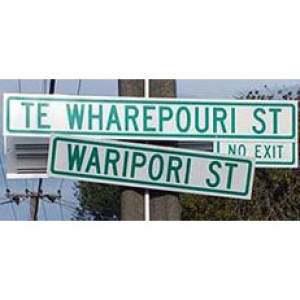
Monday Jul 20, 2020
Memorials, names and ethical remembering
Monday Jul 20, 2020
Monday Jul 20, 2020
How do we remember the past? What place do colonial memorials have in public spaces? How can we better represent diverse histories in the landscape?
In this first Public History Talk for 2020, Professor of Māori education at Victoria University, Joanna Kidman hosts a panel to discuss these issues and offer a facilitated conversation with the public on colonial memorials, history and memory.
About the panelists:
Morrie Love (Te Atiawa ki te Upoko o te Ika a Mauī, Taranaki, Ngati Ruanui) is Director Raukura Consultants, a writer and historian.
Nicky Karu (Hauraki: Paeroa and Thames Coast) Tira Poutama Iwi Partnerships.
Ewan Morris (Pākehā) is a historian with an interest in public memory and cultural contestation over symbols.
These free Public History Talks are a collaboration between the National Library of New Zealand https://natlib.govt.nz/ and Manatū Taonga/Ministry for Culture and Heritage https://mch.govt.nz/
Recorded live at the National Library of New Zealand, 15 July, 2020.
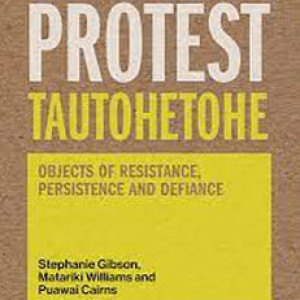
Wednesday Mar 04, 2020
‘Protest Tautohetohe: Objects of Resistance, Persistence and Defiance’
Wednesday Mar 04, 2020
Wednesday Mar 04, 2020
In this talk, authors Stephanie Gibson, Matariki Williams and Puawai Cairns will provide insights into the stories and objects that fill the recent publication ‘Protest Tautohetohe: Objects of Resistance, Persistence and Defiance’, their material history of activism in Aotearoa New Zealand.
They’ll explore the many ways New Zealanders have spoken up for change, from pulling up survey pegs to marching against the Springbok Tour. They will share histories connected to collection items from institutions around the country that are connected to protest and will discuss our diverse history of objects and images made for causes, from the New Zealand Wars to agitating for women’s rights and protecting the environment.
These monthly Public History Talks are a collaboration between the National Library of New Zealand https://natlib.govt.nz/ and the Ministry for Culture and Heritage https://mch.govt.nz/.
Recorded live at the National Library of New Zealand, 4 March 2020.
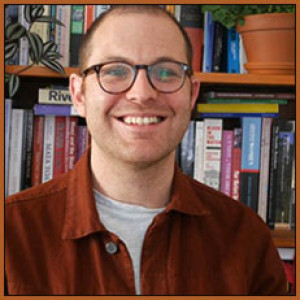
Wednesday Oct 02, 2019
Wairoa Lockout: an oral history
Wednesday Oct 02, 2019
Wednesday Oct 02, 2019
Since 2010, the small town of Wairoa on the East Coast of New Zealand has been at the centre of the most bitter and protracted industrial dispute in New Zealand’s recent history. The agri-business giant, Talley’s Group, took over the town’s meat plant in 2010 and commenced a campaign to ‘draw the line on union influence’.
Drawing on oral histories, this talk by Ross Webb focuses on the campaign by meat workers to save their union, the sacrifices involved, and the legacy of three successive lockouts on workers and the community.
Ross Webb is an historian with an interest in labour history. He is currently a PhD candidate at Victoria University, Wellington.
These monthly Public History Talks are a collaboration between the National Library of New Zealand https://natlib.govt.nz/ and the Ministry for Culture and Heritage https://mch.govt.nz/.
Recorded live at the National Library of New Zealand, 2 October 2019.

Wednesday Sep 11, 2019
Pūkana: moments in Māori performance
Wednesday Sep 11, 2019
Wednesday Sep 11, 2019
From Porgy and Bess to haka, to Elsdon Best and Tuini Ngāwai, Pūkana will range far and wide to give a sense of the ihi, wehi and wana, inherent to Maori performance.
Paul Diamond is lead curator for the Pūkana exhibition, and talks about the background to the exhibition which celebrates Māori performance across time. Paul (Ngāti Hauā, Te Rarawa and Ngāpuhi) was appointed as Curator, Māori at the Alexander Turnbull Library in 2011. He is an author and has also worked as an oral historian and broadcaster.
Pūkana opens on 14 September, 2019 and runs until 23 May 2020 at the National Library of New Zealand, in Wellington New Zealand.
These monthly Public History Talks are a collaboration between the National Library of New Zealand https://natlib.govt.nz/ and the Ministry for Culture and Heritage https://mch.govt.nz/.
Recorded live at the National Library of New Zealand, 4 September 2019.
Please note, due to copyright restrictions, some of the audio and video excerpts played during the presentation are not able to be republished and the presentation has been edited to reflect this.

